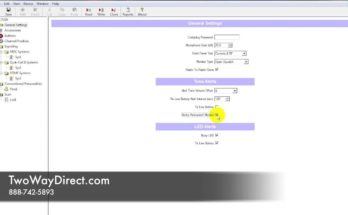Kauffman Founders School, Bill Reichert, FinancialBudgeting: Your Long‑Term Forecasting >> Okay.
So we've talked about the operatingbudget, which is really a monthly budget over a period of a year or so.
The other thingyou need as an early‑stage entrepreneurs, you need a long‑term financial forecast.
You need a five‑year projection as to how this business is going to evolve over a longerperiod of time.
Now a lot of entrepreneurs when we ask for a five‑year projection theysay, Bill, you have to be kidding me I don't know what's going to happen next month, howdo you expect me to project five years.
The reason we ask entrepreneurs to do long‑termfinancial projections is we want to see what's in your head.
And we want to see the assumptionsyou've got about your business, your competitors, and the marketplace in general.
This is oneof the reasons why it's critically important that you are personally involved in doingyour forecasting.
You cannot hand this over to some consultant, to some accountant andday do a five‑year forecast.
Because you have to know deep in your heart and deep inyour brain exactly the business you're planning to build.
And that business should be reflectedin your long‑term financial forecast.
So you remember, going back to your businessmodel formula, that's where this fits into your long‑term financial forecast.
So youtake those business model formula numbers, bottom up, build up your revenues, month‑by‑month,quarter‑by‑quarter, year‑by‑year for five years.
And then you will be able to estimatethe expenses that you're going to have to incur to achieve the revenues that you needto achieve to hit your goal as a successful company.
Go ahead, look at some templatesfor long‑term financial projections.
But don't just fill in those templates.
Createyour own model.
Your own model is driven by the business model we talked about before.
It's characterized by the unique aspects of your business that are different than anyoneelse's.
Figure out what it's going to take to get to your goals each year and to yourlong‑term goal in five years.
And then put together a long‑term financial forecastthat seems reasonable.
That's your first step and that's your first draft.
Once you have your first draft, what I'm going to ask you to do is get at least three peopleinto the room with you.
I want one of them to be an optimist.
You know, it's probablyyou.
It's probably one of the founders, the visionary.
But you don't want your financialsto be shaded by your enthusiastic optimist.
So, I want a pessimist.
I want somebody inthe room who knows how to look at stuff and say, you know, what if this doesn't happen,what if we can't hire that person, what if we can't get those contracts, what if thingsjust take longer than we thought.
Get that pessimist in there to counterbalance youroptimism.
The third person in the room needs to be a truth teller.
A realist.
The thirdperson needs to be able to go out and look for the financial reports of public companiesthat are kind of like yours, and see what of their expenditure and their different categoriesand what sort of results did they get.
So you've got an optimist, you've got a pessimistand you've got a realist in the room who are then going to review your long‑term financialforecast.
And they are going to rip it up.
And you're going to do a couple iterations.
And you're going to identify what you think you know and what you know you don't know.
You're going to have to say, okay, you know, we still don't know exactly how this is goingto play out.
But this is our current estimate.
And that's okay.
That's fine.
It's not goingto be something that you have to write in stone.
And it's not going to be somethingthat you have to live up to for your investors.
We know your long‑term forecast is goingto be wrong.
Don't worry.
We already know that.
The question is, do we believe thatyou have the discipline to build out a company against these estimates and get better andbetter and better at it overtime.
One of the biggest mistakes entrepreneursmake is their long‑term financial forecast doesn't match the rest of their business plan.
So for example, you talk about doing direct sales to the market, but your forecast doesn'tinclude direct sales as part of your expenditures.
Make sure that your long‑term financialforecast matches your business model and matches everything else you're telling investors.
You want to make sure that the business that you want to build is accurately reflectedin your long‑term financial forecast.
Source: Youtube



